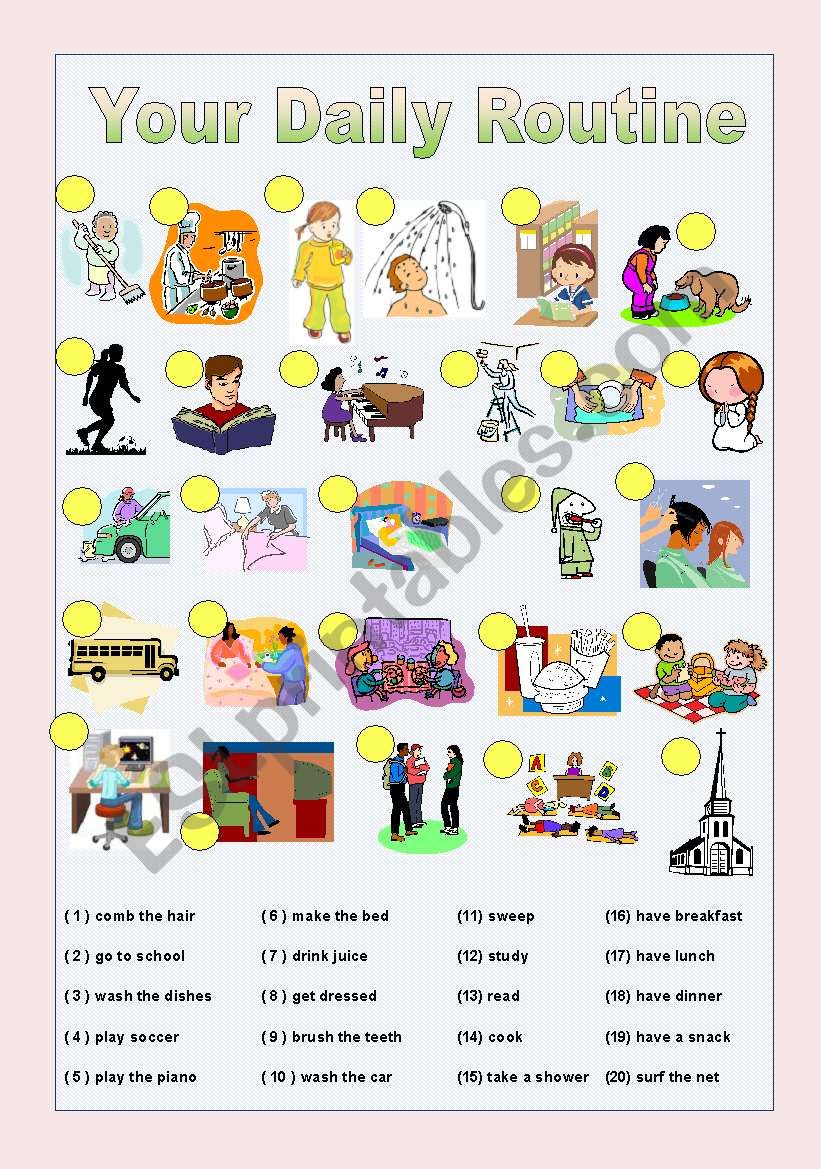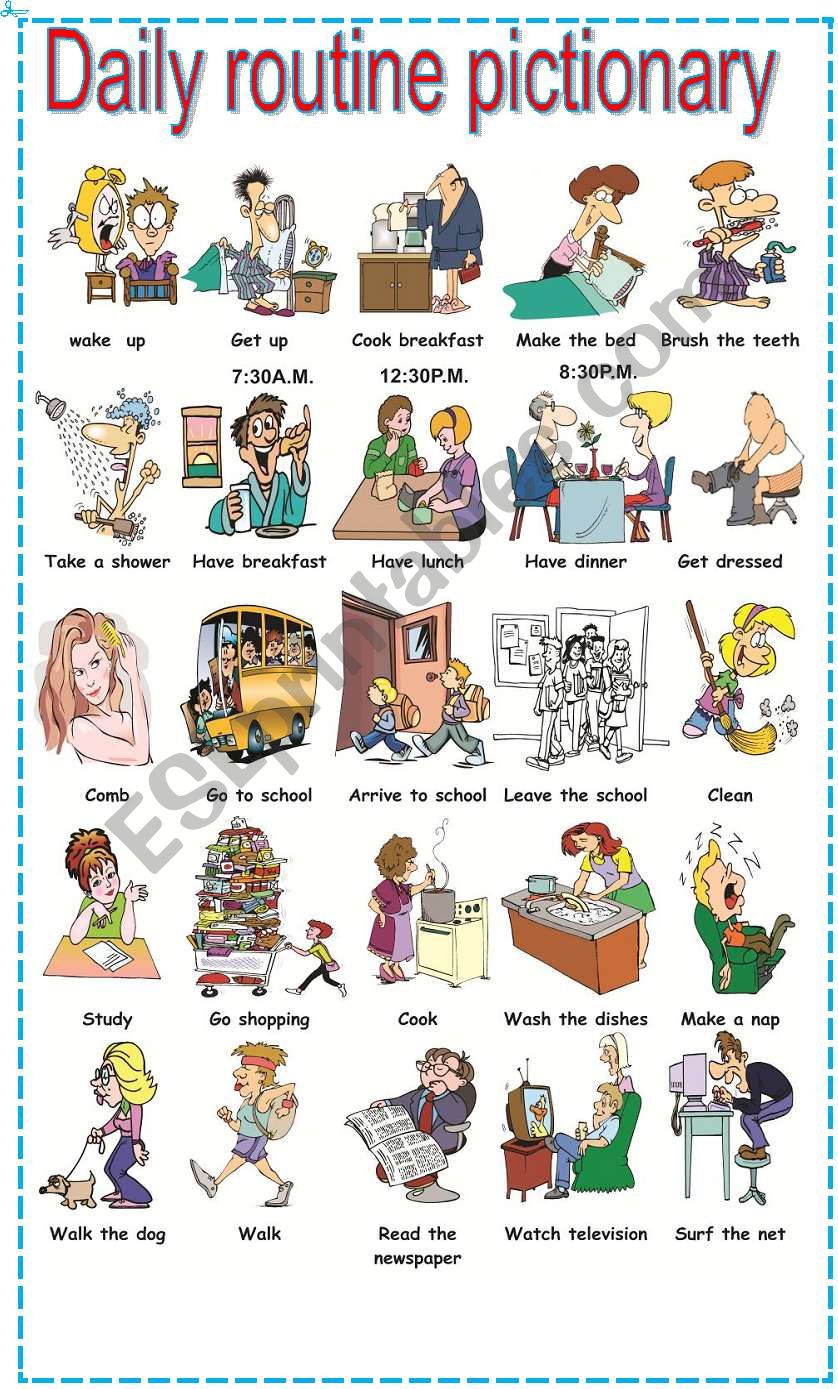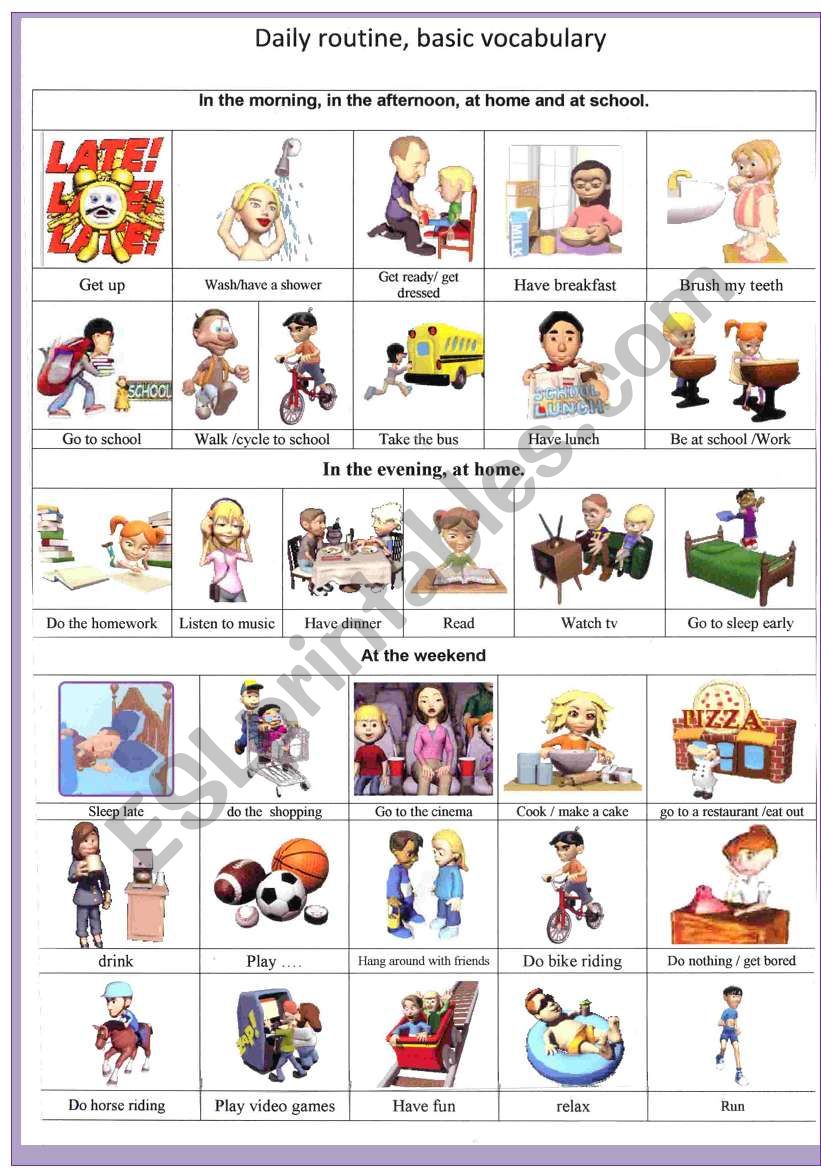
Mastering Your Day: An Extensive Guide to Daily Routines Vocabulary
Every single day, we engage in a series of activities that form our personal routines. From the moment we open our eyes to the second we drift off to sleep, our lives are structured by habits and regular tasks. For English language learners, mastering daily routines vocabulary is not just about memorizing words; it’s about unlocking the ability to describe your entire day, understand others, and navigate everyday conversations with confidence. This comprehensive guide will walk you through the essential vocabulary and expressions needed to talk about your daily life, from dawn till dusk.
Understanding and using daily routines vocabulary fluently is a cornerstone of conversational English. It allows you to share personal experiences, ask about others’ lives, and grasp common narratives in English-speaking environments. Without this foundational knowledge, everyday interactions can feel challenging and fragmented. Let’s delve into the specifics of a typical day, breaking down the vocabulary you’ll need.

The Morning Routine: Kicking Off Your Day

The morning sets the tone for the rest of your day. It’s a period packed with activities, and consequently, a rich source of vocabulary.

-

Waking Up:
- Wake up: To stop sleeping. (e.g., "I usually wake up at 7 AM.")
- Alarm clock: A device that makes a noise to wake you up. (e.g., "My alarm clock rings loudly every morning.")
- Snooze button: A button on an alarm clock that temporarily stops the alarm. (e.g., "I often hit the snooze button three times before getting up.")
- Get up / Get out of bed: To rise from your bed. (e.g., "It’s hard to get up on a cold morning.")
- Stretch: To extend your body or limbs. (e.g., "I like to stretch before I get out of bed.")


-
Personal Hygiene:

- Go to the bathroom: To use the toilet. (e.g., "First thing in the morning, I go to the bathroom.")
- Brush your teeth: To clean your teeth with a toothbrush and toothpaste. (e.g., "It’s important to brush your teeth twice a day.")
- Wash your face: To clean your face with water and soap. (e.g., "I wash my face with cold water to feel refreshed.")
- Take a shower / Take a bath: To wash your body under running water or in a tub. (e.g., "I prefer to take a shower in the morning.")
- Comb your hair / Brush your hair: To tidy your hair. (e.g., "After my shower, I comb my hair.")
- Get dressed: To put on your clothes. (e.g., "I get dressed quickly before breakfast.")
- Put on makeup: To apply cosmetics to your face. (e.g., "She puts on her makeup while listening to the news.")
-
Breakfast & Preparation:
- Make breakfast / Prepare breakfast: To cook or get breakfast ready. (e.g., "My dad makes breakfast on weekends.")
- Eat breakfast / Have breakfast: To consume your morning meal. (e.g., "I usually have breakfast with my family.")
- Have a cup of coffee / tea: To drink coffee or tea. (e.g., "I can’t start my day without a cup of coffee.")
- Pack your bag / Backpack: To put things into your bag for the day. (e.g., "I pack my bag with my laptop and books.")
- Check emails / Check social media: To look at your email or social media accounts. (e.g., "Before leaving, I quickly check my emails.")
- Leave home / Head out: To depart from your house. (e.g., "I leave home around 8 AM for work.")
- Commute (to work/school): To travel regularly between your home and place of work/study. (e.g., "My commute to work takes about 30 minutes.")


The Afternoon Routine: Midday Activities and Productivity
The afternoon often involves work, study, and a midday meal. This part of the day can be quite structured, especially for those in employment or education.
-
Work/Study:
- Go to work / Go to school: To arrive at your workplace or educational institution. (e.g., "I go to work by bus.")
- Attend a meeting: To participate in a formal discussion. (e.g., "I have to attend a meeting at 10 AM.")
- Send emails: To compose and transmit electronic messages. (e.g., "I spend a lot of time sending emails at work.")
- Work on a project: To dedicate time and effort to a specific task. (e.g., "I’m currently working on a new project.")
- Study: To learn or review academic material. (e.g., "Students study hard for their exams.")
- Take notes: To write down important information. (e.g., "It’s helpful to take notes during lectures.")
-
Lunch Break:
- Have lunch / Eat lunch: To consume your midday meal. (e.g., "I usually have lunch around 1 PM.")
- Pack a lunch: To prepare and bring your own lunch. (e.g., "I pack a lunch to save money.")
- Go out for lunch: To eat lunch at a restaurant or cafe. (e.g., "Sometimes, my colleagues and I go out for lunch.")
- Take a break: To pause from work or study. (e.g., "I like to take a short break in the afternoon.")
- Grab a snack: To quickly eat a small amount of food. (e.g., "I sometimes grab a snack from the vending machine.")
-
Afternoon End:
- Finish work / Finish classes: To complete your work or studies for the day. (e.g., "I finish work at 5 PM.")
- Leave work / Leave school: To depart from your workplace or school. (e.g., "I leave work as soon as I finish my tasks.")
- Head home: To start going back to your house. (e.g., "After work, I head home straight away.")
The Evening Routine: Winding Down and Socializing
The evening is often a mix of chores, leisure, and social activities, leading up to bedtime.
-
Arrival & Chores:
- Arrive home / Get home: To reach your house. (e.g., "I usually get home around 6 PM.")
- Change clothes / Change into comfortable clothes: To put on different attire. (e.g., "As soon as I get home, I change into comfortable clothes.")
- Do laundry: To wash clothes. (e.g., "I do laundry once a week.")
- Wash the dishes / Do the dishes: To clean plates, cups, and cutlery. (e.g., "My partner usually washes the dishes after dinner.")
- Clean up / Tidy up: To make a place neat and orderly. (e.g., "We clean up the living room before bed.")
- Run errands: To go out to do small tasks, often for a household. (e.g., "On my way home, I often run errands like picking up groceries.")
- Go grocery shopping: To buy food and household items. (e.g., "I go grocery shopping every Tuesday evening.")
-
Dinner & Leisure:
- Cook dinner / Prepare dinner: To make the evening meal. (e.g., "I enjoy cooking dinner for my family.")
- Eat dinner / Have dinner: To consume your evening meal. (e.g., "We have dinner together every night.")
- Set the table: To arrange plates, cutlery, and glasses for a meal. (e.g., "The kids help set the table for dinner.")
- Clear the table: To remove plates and cutlery after a meal. (e.g., "After dinner, I clear the table.")
- Watch TV / Watch a movie: To view television programs or films. (e.g., "We often watch TV after dinner.")
- Read a book / Read a newspaper: To engage with written material. (e.g., "I like to read a book before bed.")
- Listen to music / Listen to a podcast: To hear audio. (e.g., "I listen to music while I cook.")
- Go for a walk / Take a stroll: To walk for pleasure or exercise. (e.g., "Sometimes, we go for a walk around the neighborhood.")
- Exercise / Work out: To perform physical activity for fitness. (e.g., "I exercise three times a week.")
- Call friends / Call family: To speak to people on the phone. (e.g., "I call my parents every evening.")
- Spend time with family / friends: To enjoy leisure time with loved ones. (e.g., "We spend quality time with family on weekends.")
-
Preparation for Next Day:
- Prepare clothes for tomorrow: To lay out clothes for the next day. (e.g., "I prepare my clothes for tomorrow before I go to bed.")
- Pack lunch for tomorrow: To make and pack your lunch for the next day. (e.g., "I pack my lunch for tomorrow to save time in the morning.")
The Night Routine: Rest and Recharge
The final part of the day involves winding down and preparing for sleep.
-
Winding Down:
- Take a shower / Take a bath: Some people prefer an evening shower or bath to relax. (e.g., "I take a warm bath to relax before bed.")
- Brush your teeth: Another essential hygiene step. (e.g., "I always brush my teeth right before bed.")
- Wash your face: (e.g., "I wash my face and apply moisturizer.")
- Read in bed: To read while lying in bed. (e.g., "I enjoy reading in bed for about 20 minutes.")
- Meditate: To practice mindfulness or spiritual contemplation. (e.g., "I meditate for a few minutes to clear my mind.")
- Listen to a podcast/audiobook: A relaxing way to wind down. (e.g., "I often listen to a calming podcast until I fall asleep.")
-
Sleeping:
- Go to bed: To get into bed for sleep. (e.g., "I try to go to bed by 10 PM on weekdays.")
- Fall asleep: To begin sleeping. (e.g., "It sometimes takes me a while to fall asleep.")
- Sleep soundly: To sleep deeply and peacefully. (e.g., "I hope to sleep soundly tonight.")
- Have dreams / Have nightmares: To experience images, sounds, or feelings during sleep. (e.g., "I often have vivid dreams.")
- Set the alarm: To program the alarm clock for the next morning. (e.g., "Don’t forget to set the alarm!")
Beyond the Basics: Expanding Your Daily Routines Vocabulary
To truly master discussing your daily life, consider these additional linguistic tools:
- Frequency Adverbs: These words describe how often an activity occurs.
- Always, usually, often, sometimes, rarely, never. (e.g., "I always wake up early." "I rarely eat fast food.")
- Time Expressions:
- In the morning / afternoon / evening: (e.g., "I exercise in the morning.")
- At night / At noon / At midnight: (e.g., "I read at night.")
- Early / Late: (e.g., "I get up early." "I stay up late.")
- On weekdays / On weekends: (e.g., "On weekdays, I work. On weekends, I relax.")
- Every day / Every other day: (e.g., "I commute every day.")
- Phrasal Verbs: Many routine activities involve phrasal verbs, which combine a verb with a preposition or adverb to create a new meaning.
- Get up, wake up, put on (clothes), take off (clothes), clean up, tidy up, settle down, wind down.
- Adjectives to Describe Routines:
- Busy, hectic, relaxed, predictable, irregular, challenging, enjoyable, monotonous.
Why Master Daily Routines Vocabulary?
Mastering daily routines vocabulary is not just about memorizing words; it’s about building a framework for countless conversations. Here’s why it’s so crucial:
- Fluency and Confidence: Being able to articulate your day seamlessly boosts your confidence in speaking English.
- Understanding Others: When people describe their day, you’ll comprehend their experiences and respond appropriately.
- Cultural Insight: Daily routines often reflect cultural norms and expectations. Learning the vocabulary helps you understand these nuances.
- Practical Application: This vocabulary is used constantly in real-life scenarios, from casual chats to job interviews.
Tips for Learning and Practicing Daily Routines Vocabulary
- Personalize It: Write down your own daily routine using the new vocabulary. This makes it relevant and easier to remember.
- Use Context: Don’t just learn individual words. Learn them in phrases and sentences. How does "brush my teeth" fit into your morning?
- Journaling: Start a daily journal in English, focusing on describing your activities. This forces you to actively recall and use the vocabulary.
- Speaking Practice: Describe your day to a language partner, friend, or even to yourself in the mirror. Practice makes perfect.
- Shadowing: Listen to native speakers describing their routines (e.g., on YouTube, podcasts) and try to imitate their pronunciation and rhythm.
- Flashcards and Apps: Use tools like Anki or Quizlet to create flashcards for new words and phrases.
- Role-Playing: Imagine scenarios where you’re asked about your day and practice your responses.
In conclusion, the journey to English fluency is built step by step, and a strong command of daily routines vocabulary is an indispensable part of that foundation. By diligently learning and actively practicing the words and expressions related to your everyday life, you will not only enhance your descriptive abilities but also gain the confidence to engage more deeply in conversations. Embrace the journey of mastering this essential vocabulary, and watch your English communication skills flourish!
